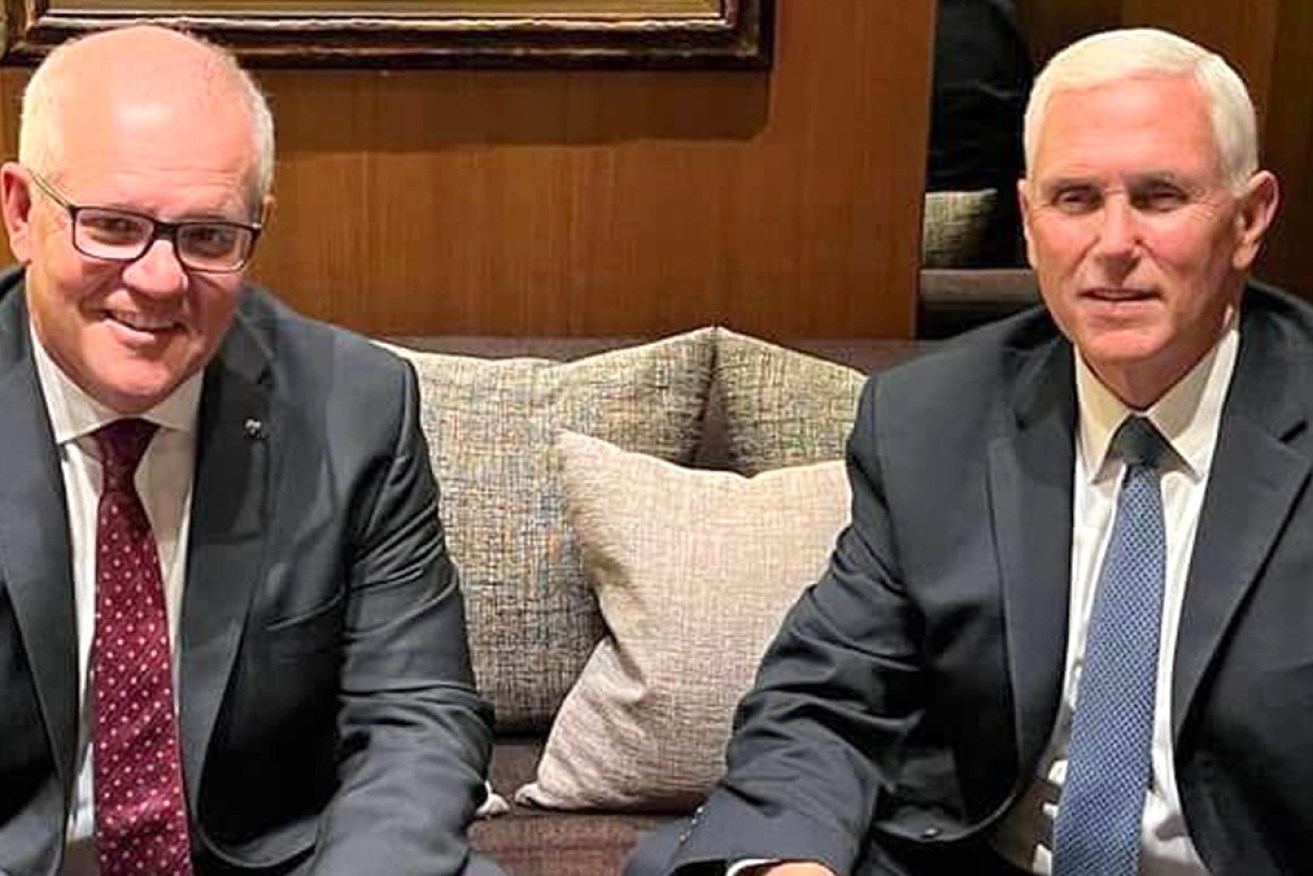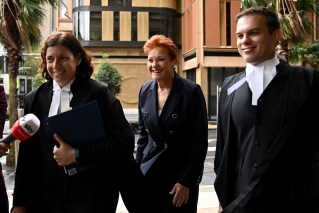‘Taking the hit’: Morrison reveals reasons for Coalition’s election loss


Scott Morrison with former US vice-president Mike Pence in Seoul. Photo: Facebook/Scott Morrison
Scott Morrison has given his fullest explanation for the Coalition’s federal election loss yet, blaming the “hit for the mission” of managing the pandemic.
Mr Morrison’s admission comes in a speech to an international forum in South Korea, where he has been mingling with other leaders, including former US vice-president Mike Pence, former US first lady Michelle Obama and former Malaysian PM Mahathir Mohamad.
The speech to the Asian Leadership Conference in Seoul on Thursday was “given exclusively to The Australian“ ahead of time.
“The results we were able to achieve were no accident. It was ‘no fluke’ as we like to say,” Mr Morrison will reportedly say of his government’s management of COVID.
“Australia’s results do tell a proud story: One of the lowest fatality rates, highest vaccination rates and strongest economic performances of any developed country in the world.”
It is the former prime minister’s first major public speech since the May 21 federal election defeat.
He is expected to defend his government’s handling of the pandemic, ranking it among the world’s best – despite frustrations among some Australians.
“Australia has the third lowest mortality rate in the OECD at 401 deaths per million population. This can be compared with Canada at 1106 per million, the UK at 2688 per million and the US at 3031 per million. During the pandemic, we estimate that when compared to the average fatality rates of OECD countries, Australia’s response saved an estimated 40,000 lives,” he will say.
“More than 95 per cent of the Australian adult population have had two vaccine doses, and we have already commenced fourth doses.”
Mr Morrison will also say that Australia’s success was partly due to limiting the scale of COVID’s economic hit.
He will also explain the reasoning behind the national cabinet, a process that the new government has retained.
“Frustration with the national cabinet was actually frustration with the nature of our Constitution and federation,” he will say in the speech.
“But in a crisis, this was no time to engage in a political debate about our federation, nor as the national leader to pick fights with provincial leaders.
“Leadership often requires you to take the hit for the mission you are engaged in.
“This was certainly the case when it came to managing our federation during the pandemic.
“A crisis demanded that you curb your natural defensive domestic political instincts to focus on the bigger job and bigger picture. It could not be politics as usual.
“That said, for all its critics, the national cabinet proved its worth in the outcomes we were able to achieve together. And I am yet to hear of a better alternative.”
Tweet from @alcinseoul
Mr Morrison will say he chaired 57 meetings of the national cabinet as prime minister – and there wasn’t always agreement around the table.
“At no time in our history had state and federal leaders met as often, as extensively and with such candour as during this time,” he will say.
“But we didn’t always agree, especially when it came to issues where the medical advice was not consistent, such as state borders, school closures or vaccine mandates.
“As the pandemic evolved, it became more difficult to keep uniformity in the various restrictions employed by each state as the experience of the virus was no longer uniform.
“When we disagreed, this caused great frustration among the public. While such disagreement was inevitable, many Australians found it difficult to understand why the prime minister could not just make the decisions.
“Some even mistakenly believed that the establishment of the national cabinet had devolved federal powers to the states. This was untrue. The states had always had these powers.”

Mr Morrison with former Malaysian PM Mahathir Mohamad in Seoul. Photo: Facebook/Scott Morrison
The Australian reports that Mr Morrison will conclude that, on reflection, the key to managing the pandemic was to be across the detail.
“As I look back on those times now, there are many takeouts, especially from a leadership perspective,” he will say.
“One of the most important is that in a crisis leaders must be across the detail.
“You quickly become the central point of all information, communication and decision-making.
“You set the pace, tone and direction of the national response. Attention to detail matters critically, especially when it comes to process.
“Events move very quickly in a crisis. Sound process provides the guardrails to get things as right as you can, and the mechanisms to fix them quickly when you don’t.
“The flow and source of your information and advice, the decision-making process, your accountability and follow-up mechanisms, implementation plans – it all matters.
“This should not be confused with becoming a control freak, wanting to be hands-on in implementing all aspects of your response. That is a recipe for disaster,” he will say.
“You must be able to trust and delegate, understanding that you and your team will not get everything right. And you must reconcile yourself to the fact that when it does go wrong (which it certainly will at some point) and events conspire against your best-laid plans and advice, as the leader you will just have to cop it.”








